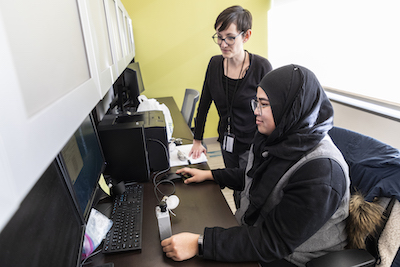George Mason University’s $214 million in research funding in fiscal year 2021 represented an increase of more than $100 million over five years, and puts the university on track to meet its goal of $225 million by 2025.
The latest figures released by the National Science Foundation (NSF) show Mason’s research funding in the top 25 nationally in the areas of:
- Social sciences: 11th among all universities (best in the DMV) and 8th among public universities.
- Computer and information sciences: 19th among all universities and 11th among public universities in federally funded research; and 24th among all universities and 16th among public universities in total research funding.
- Engineering: In the top 100 nationally at No. 78 (up from 142 in 2018) and No. 56 among public universities.

Overall, Mason’s research and development funding was 77th among public institutions, and 59th among institutions without medical schools.
“Even with the challenges of the pandemic period, Mason continued to advance in research rankings as measured by expenditures,” said Andre Marshall, Mason’s vice president of research, innovation, and economic development. “Mason faculty, student, and staff researchers are driving discoveries together in STEM and the social sciences through university-based research that results in real-world impact and makes a difference in our communities.”
Added Ken Ball, dean of Mason’s College of Engineering and Computing: “The rise in our NSF research funding rankings both in computer and information sciences and engineering has been phenomenal, solidifying our reputation as a top-tier research institution. Credit goes to our incredible faculty and students, as well as our research centers.”
Some of the long-term projects either funded or ongoing in FY 2021 that have positioned Mason as a leader in research of consequence—while also defining the university’s core beliefs that no problem is unsolvable and that we grow wiser and stronger from examining full truths—include:
- The National Oceanic and Atmospheric Administration (NOAA) working with a group of Mason scientists to update its drought forecasting system. Researchers leading the effort are from Mason’s Center for Ocean Land Atmosphere Studies in the College of Science.
- Researching and building 5G-enabling applications and technologies to create new business, community, and higher education engagements. The program builds on Mason’s work in 5G and the ecosystem of university, industry and government partners collaborating through the Northern Virginia Node of the Commonwealth Cyber Initiative.
- The Computational Hemodynamics Lab, as part of a large study funded by the National Institute of Neurological Disorders and Stroke, is studying major risk factors for aneurysms and how to identify high-risk patients who need prompt and aggressive treatments.
- A grant from the Jeffress Trust Awards Program in Interdisciplinary Research helped the Department of Global and Community Health in Mason’s College of Public Health explore the link between air pollution sources and vulnerable populations.
- A multidisciplinary team from the College of Engineering and Computing and the College of Science is being funded by the Food and Drug Administration to improve the manufacturing and understanding of mRNA vaccines, such as those to fight COVID-19.
- As part of a project funded by the Department of Energy, Mason is overseeing and operating the East Coast headquarters of the Cybersecurity Manufacturing Innovation Institute, helping protect American manufacturing automation and supply chains from cyber threats.

In the social sciences, which includes contributions from the College of Humanities and Social Sciences (CHSS), the Schar School of Policy and Government, the College of Education and Human Development (CEHD), and the Jimmy and Rosalynn Carter School for Peace and Conflict Resolution, initiatives came in several forms.
“These rankings reflect the excellence that distinguishes George Mason’s research and sets it apart,” CHSS dean Ann Ardis said. “The expertise of our social sciences faculty enables us to effectively and creatively address the world’s most pressing challenges.”
Said CEHD dean Ingrid Guerra-López: “Solving complex societal problems requires transdisciplinary collaborations, and that is what guides the important work of our remarkable researchers. The impact of their work is being amplified by their ability to work effectively across a variety of disciplines, industries, and stakeholders.”
- Assistant professor Sylvia Schreiner received a grant from the National Science Foundation to continue her work in helping to maintain the Yupik language on St. Lawrence Island in Alaska. That research later led to an NSF CAREER grant for the same purpose.
- Mason was selected by the Department of Homeland Security to lead its Center of Excellence in Crime Investigations and Network Analysis (CINA). The 10-year, multimillion-dollar grant gave Mason the lead with a consortium of universities and law enforcement agencies to investigate patterns of criminal activity and forensics, and develop strategies to disrupt transnational crime.
- The Center for Advancing Correctional Excellence, led by University Professor Faye Taxman, received $25 million from the National Institute on Drug Abuse to advance the use of evidence-based practices and treatments in justice settings for individuals with substance use and mental health disorders, spur implementation research on organizational change strategies, develop workforce training tools, and disseminate research findings.
- Through a grant from the Washington Center for Equitable Growth, CEHD professor Bweikia Steen was part of a research group that studied the barriers and challenges faced by home-based childcare providers in Virginia and developed solutions.
- The U.S. Department of State and the NSF funded Carter School research in war-torn Ukraine.
“With rapid socio-economic and political changes, technological advancements, geopolitical shifts, climate change and global health crises, the world faces many challenges,” Carter School dean Alpaslan Özerdem said. “Social sciences are centered on all those tectonic movements affecting our societies and our responses to global challenges.”
“The (NSF) rankings are a testimony to the university’s commitment to research of consequence,” Schar School Dean Mark J. Rozell said. “The Schar School is very proud to be part of this notable achievement.”
The NSF collected its data from 916 universities in the Higher Education Research and Development Survey, sponsored by the NSF’s National Center for Science and Engineering Statistics unit.
More About How Mason Stacks Up in the Rankings
- April 11, 2024
- April 10, 2024
- April 3, 2024
- February 7, 2024
- January 30, 2024
